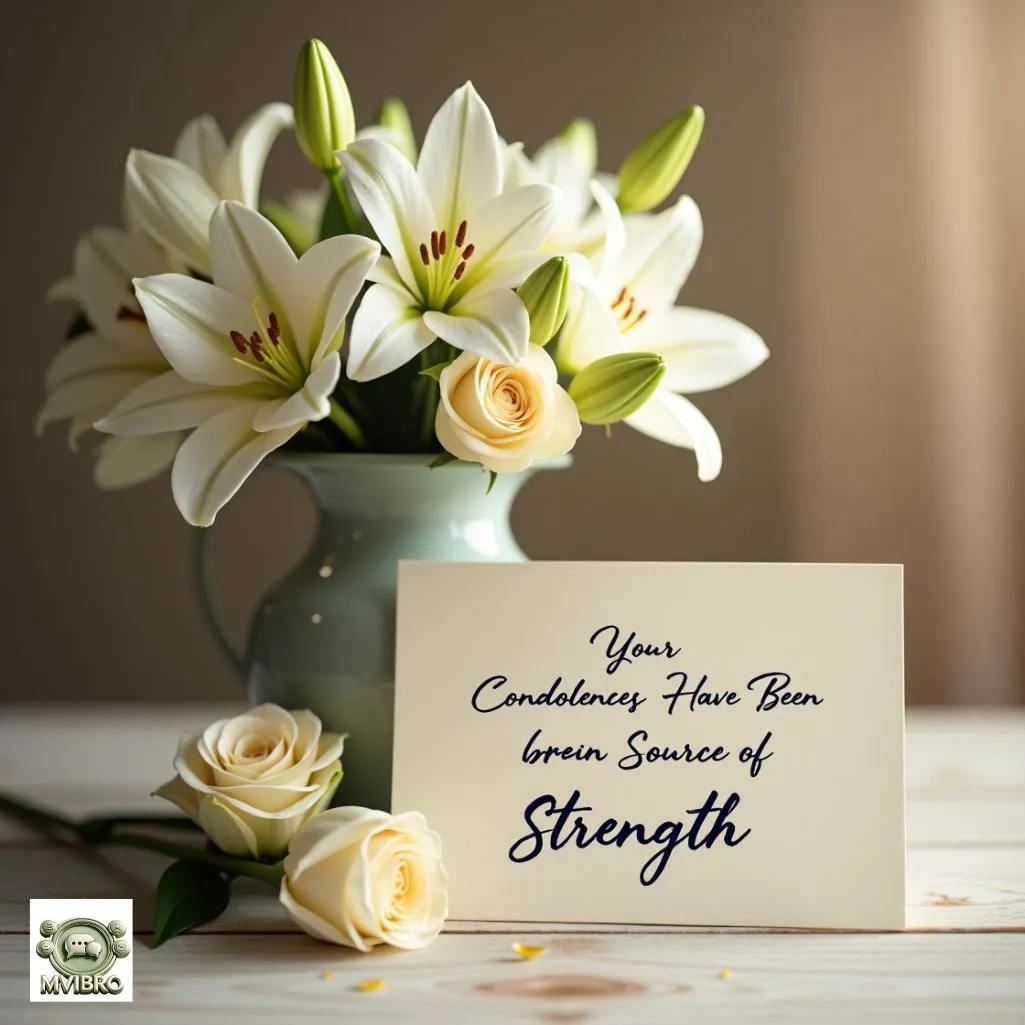When you receive a condolence message, it can be challenging to find the right words to reply. When you’re seeking a sense of relaxation, aiming to celebrate the support you’ve received, or simply wanting to express your appreciation, a heartfelt reply can bring comfort and foster connection.
The way you respond matters because it not only helps in easing the emotional burden but also strengthens bonds, creating a space for genuine compassion and mutual understanding.
In this guide, we’ve curated 35+ creative replies to help you craft the perfect response. These suggestions are designed to acknowledge the kindness, share your gratitude, and offer solace in return.
One of the most common greetings you’ll encounter is a message that begins with “I’m so sorry for your loss.” Understanding how to reply to a condolence message like this is essential, as it allows you to reflect your feelings in a sincere and comforting way. Keep reading for sample responses and guidance on how to navigate this delicate situation with grace and appreciation.
Thank You for Your Condolences
Acknowledging someone’s sympathy shows appreciation for their gesture of support during a challenging time.
Example:
Friend:
“I’m so sorry for your loss. My thoughts are with you.”
You:
“Thank you for your condolences. Your kindness is greatly appreciated.”
By thanking the person, you convey your gratitude, letting them know their message has been received and valued.
Your Kind Words Mean a Lot to Me
Acknowledging the emotional impact of their message shows that their words have touched you deeply during this difficult period.
Example:
Friend:
“Sending you love and strength during this time.”
You:
“Your kind words mean a lot to me. They bring comfort.”
By emphasizing the significance of their words, you convey how their support is helping you cope.
I Appreciate Your Support During This Difficult Time
Expressing gratitude for someone’s support reinforces the importance of their kindness during a time of grief.
Example:
Friend:
“I’m here for you. Let me know if you need anything.”
You:
“I truly appreciate your support during this difficult time. It means the world to me.”
This response emphasizes the value of their offer of help and acknowledges the comfort their presence provides.
Your Thoughtfulness Is Truly Appreciated
Acknowledging someone’s thoughtfulness demonstrates that their care and concern are not overlooked.
Example:
Friend:
“I know this is a tough time. I’m just a call away.”
You:
“Your thoughtfulness is truly appreciated. It brings me peace knowing you’re there.”
By recognizing their consideration, you show how much their kindness is helping ease your emotional burden.
Your Condolence Has Touched My Heart

Expressing how deeply their message has affected you shows vulnerability and reinforces the emotional connection.
Example:
Friend:
“My heart goes out to you. Please let me know if you need anything.”
You:
“Your condolence has touched my heart. I’m so grateful for your support.”
This response highlights the deep emotional impact their message has had, reaffirming the bond between you and the person offering condolences.
Your Words Bring Comfort to My Family and Me
Acknowledging that their message provides comfort to not just you, but your family as well, highlights the wide-reaching effect of their kindness.
Example:
Friend:
“I’m keeping you and your family in my thoughts during this time.”
You:
“Your words bring comfort to my family and me. We truly appreciate it.”
This response expresses gratitude for the support, emphasizing that their words have a collective positive impact on everyone affected.
I Am Grateful for Your Support and Understanding
Expressing gratitude for someone’s support and understanding during a difficult time strengthens the emotional connection and reinforces your appreciation.
Example:
Friend:
“I understand how hard this is. I’m here for you.”
You:
“I am grateful for your support and understanding. It gives me strength.”
This response acknowledges how their support makes a difference and highlights how much their empathy means to you.
Your Condolences Have Meant a Great Deal to Me
Expressing how deeply you value their condolences reinforces the significance of their words in your healing process.
Example:
Friend:
“I’m so sorry for your loss. Please know that I’m here if you need anything.”
You:
“Your condolences have meant a great deal to me. I feel supported.”
This response emphasizes how much their message has impacted you emotionally, reinforcing the connection between you both.
Thank You for Thinking of Us During This Time
Acknowledging their thoughtfulness for remembering you and your family during a difficult time helps maintain a sense of care and connection.
Example:
Friend:
“My heart goes out to you and your family. You’re in my prayers.”
You:
“Thank you for thinking of us during this time. It means so much.”
This response expresses your gratitude, reinforcing how meaningful their thoughtfulness is to you and your family.
Your Kindness Is a Source of Strength for Me
Recognizing someone’s kindness as a source of strength highlights the positive impact their support is having on your ability to cope.
Example:
Friend:
“I’m so sorry for your loss. Please reach out if you need anything at all.”
You:
“Your kindness is a source of strength for me. I’m so grateful.”
This response emphasizes how their gesture provides you with emotional support, helping you navigate through a difficult period.
Your Sympathy Has Brought Us Comfort
Acknowledging that their sympathy has helped ease your grief shows how much their kindness has made a positive difference.
Example:
Friend:
“My deepest condolences to you and your family. I’m thinking of you.”
You:
“Your sympathy has brought us comfort. Thank you for your kindness.”
This response shows that their message has been a source of relief during a difficult time, reinforcing how much their support is valued.
Your Thoughtful Words Have Touched My Heart
Expressing that their words have had a deep emotional impact allows you to show how much their care has meant to you.
Example:
Friend:
“I’m so sorry for your loss. I’m here for you, no matter what you need.”
You:
“Your thoughtful words have touched my heart. I’m deeply moved.”
This response emphasizes the emotional depth of their message and expresses sincere gratitude for their support.
I Am Deeply Touched by Your Thoughtfulness
This response highlights how their gesture of kindness has left a lasting impression on you, reinforcing how much their compassion is appreciated.
Example:
Friend:
“I know this is a hard time, but I want you to know I’m thinking of you.”
You:
“I am deeply touched by your thoughtfulness. Your words bring me comfort.”
By acknowledging the depth of their empathy, you reinforce the emotional impact of their kind message.
Your Support Means More Than Words Can Express
A response like this highlights that your gratitude for their support goes beyond simple words, showing how much their help truly matters.
Example:
Friend:
“I can’t imagine what you’re going through, but I’m here for you whenever you need me.”
You:
“Your support means more than words can express. I truly appreciate it.”
This response shows that their offer of support goes beyond the surface, deeply impacting your emotional well-being.
Thank You for Reaching Out to Us
Expressing gratitude for their effort to contact you demonstrates how much their outreach during this time means to you.
Example:
Friend:
“I just wanted to check in and let you know I’m here for anything you need.”
You:
“Thank you for reaching out to us. Your support is incredibly comforting.”
This response acknowledges their effort to connect with you, highlighting the emotional support that their outreach provides during a challenging time.
Your Condolence Message Was Heartwarming
Acknowledging that their message has warmed your heart emphasizes the comfort and compassion it has provided during your time of loss.
Example:
Friend:
“I’m so sorry for your loss. Please know I’m here for you whenever you need.”
You:
“Your condolence message was heartwarming. It brought me much-needed peace.”
This response highlights how their message has made a positive emotional impact, offering comfort in your difficult time.
Your Kindness Has Been a Beacon of Light
Describing their kindness as a “beacon of light” reflects how their support has guided you through the darkness of grief.
Example:
Friend:
“I’m deeply sorry for your loss. You and your family are in my thoughts.”
You:
“Your kindness has been a beacon of light. It’s helping me find my way through this.”
This response emphasizes how their support acts as a guiding light, providing hope and comfort when you need it most.
Jump to Read this: Genius Comebacks to Showcase Your ‘Wit Like a Pro
Your Condolences Have Been a Comforting Reminder
Acknowledging that their message serves as a comforting reminder emphasizes the ongoing support and care you’re receiving.
Example:
Friend:
“I can’t imagine what you’re going through, but I’m always here for you.”
You:
“Your condolences have been a comforting reminder of how much I’m supported.”
This response shows that their words bring a sense of reassurance and emotional relief, reminding you that you’re not alone.
I Am Moved by Your Compassion and Support
Expressing that you are “moved” highlights how deeply their compassion has touched your heart during this difficult period.
Example:
Friend:
“I’m so sorry for your loss. Please don’t hesitate to reach out for anything.”
You:
“I am moved by your compassion and support. It gives me strength during this tough time.”
This response shows that their care has emotionally resonated with you, reinforcing how much their kindness means.
Your Condolences Have Been a Source of Strength

By recognizing their condolences as a source of strength, you convey how their support empowers you to keep going.
Example:
Friend:
“My thoughts are with you, and I’m here to support you in any way I can.”
You:
“Your condolences have been a source of strength. Your support truly helps me stay strong.”
This response emphasizes how their message of support is not only comforting but also empowering, helping you navigate through your grief.
Your Thoughtful Gesture Is Truly Appreciated
Acknowledging the thoughtfulness behind their gesture highlights the significance of their action during a time of grief.
Example:
Friend:
“I’m thinking of you and your family during this difficult time.”
You:
“Your thoughtful gesture is truly appreciated. It means a lot to us.”
This response shows that you recognize and value their kind actions, reinforcing how their support has had a positive impact.
Your Words Have Brought Us Peace
Acknowledging that their words have provided peace emphasizes the calming effect of their message during a stressful and emotional time.
Example:
Friend:
“I’m so sorry for your loss. I’m here for anything you need.”
You:
“Your words have brought us peace. They are a great comfort to us.”
This response highlights how their message has helped bring a sense of calm and reassurance to you and your family.
I Am Grateful for Your Kindness and Support
Expressing gratitude for their kindness and support conveys how much their efforts are appreciated, reinforcing the emotional bond.
Example:
Friend:
“Please let me know if you need help with anything. I’m always here for you.”
You:
“I am grateful for your kindness and support. It’s helping me through this difficult time.”
This response emphasizes your appreciation for both their offer of help and their emotional support during your grief.
Your Condolence Message Was Heartfelt
Acknowledging that their message was heartfelt emphasizes the sincerity and emotional depth behind their words, making it even more meaningful.
Example:
Friend:
“I’m truly sorry for your loss. My heart goes out to you and your family.”
You:
“Your condolence message was heartfelt. It deeply touched me and brought comfort.”
This response highlights how their message wasn’t just a simple gesture, but something that truly resonated with you emotionally.
Thank You for Your Loving Words
Expressing thanks for their loving words conveys deep gratitude for their emotional support and care during a difficult time.
Example:
Friend:
“I’m so sorry for your loss. You and your family are in my thoughts.”
You:
“Thank you for your loving words. They bring me comfort and strength.”
This response shows appreciation for their emotional kindness, emphasizing how their words are helping you cope with your grief.
Your Thoughtful Message Means the World to Me
Recognizing the deep value of their message shows how much it has impacted you and provides a sense of gratitude during a challenging time.
Example:
Friend:
“I am so sorry for your loss. I’m keeping you in my thoughts and prayers.”
You:
“Your thoughtful message means the world to me. It brings me comfort during this tough time.”
This response emphasizes how deeply their words have impacted you, making you feel supported and cared for.
I Am Grateful to Have Your Support
Acknowledging the value of their support highlights how much you appreciate their presence and assistance during a difficult time.
Example:
Friend:
“I’m here for you, whether you need someone to talk to or help with anything.”
You:
“I am grateful to have your support. It’s been a great help to me.”
This response conveys your gratitude for their offer of emotional or practical support, making it clear how valuable their presence is.
Your Condolences Have Been a Comforting Presence
Describing their condolences as a “comforting presence” emphasizes how their words or actions have had a calming and reassuring effect.
Example:
Friend:
“My deepest condolences. Please let me know if there’s anything I can do for you.”
You:
“Your condolences have been a comforting presence. They bring me peace.”
This response reflects the emotional relief their words provide, making you feel less alone in your grief.
Your Kind Words Have Touched Our Hearts
Expressing how their words have “touched our hearts” emphasizes the emotional connection their message has created.
Example:
Friend:
“I’m so sorry for your loss. My heart goes out to you and your family.”
You:
“Your kind words have touched our hearts. We’re deeply grateful for your support.”
This response emphasizes the emotional impact of their words, showing how much their empathy means to you and your family.
Your Support Has Been Invaluable to Us
Acknowledging that their support has been “invaluable” underscores how much their assistance has helped you through this challenging time.
Example:
Friend:
“Please know that I’m here for you if you need anything at all.”
You:
“Your support has been invaluable to us. We truly appreciate everything you’ve done.”
This response highlights that their presence and support have been essential, showing that you could not have navigated this difficult time without them.
Key Insight
1. What is the best way to reply to a condolence message?
The best way to reply is to express gratitude for the sender’s kindness. Acknowledge their support and how it has helped you during this challenging time. Keep it heartfelt but simple.
2. Should I reply to every condolence message I receive?
It is important to respond to condolence messages, but it’s understandable if you don’t have the energy to reply to each one individually. You can send a general message of thanks or a personalized reply when you feel ready.
3. What are some simple phrases to use when replying to a condolence message?
Phrases like “Thank you for your kind words,” “Your support means a lot to me,” or “I appreciate your thoughtful message” are simple, yet sincere responses that express your gratitude.
4. Is it okay to express my emotions when replying to a condolence message?
Yes, it’s completely okay. Your response should be genuine and reflect your feelings. Whether you choose to express sadness, appreciation, or strength, being honest about your emotions can help deepen connections with those offering condolences.
5. How soon should I reply to a condolence message?
There is no set time frame for replying, but it’s best to acknowledge the message as soon as you feel ready. Don’t rush the process—take the time you need to gather your thoughts.
Conclusion
Replying to a condolence message can feel challenging, but it’s a meaningful way to express gratitude and connect with others during a difficult time. If you use these replies, you can make your conversation more positive.
IF your response is brief or more heartfelt, acknowledging the support and kindness you’ve received helps strengthen bonds and brings comfort. Always remember that there is no “perfect” replywhat matters most is that your response is sincere and comes from the heart.

Hi! I’m Zadie Smith, a passionate contributor to mvibro.com, where I share dynamic responses and clever comebacks to help you handle any situation with confidence.

